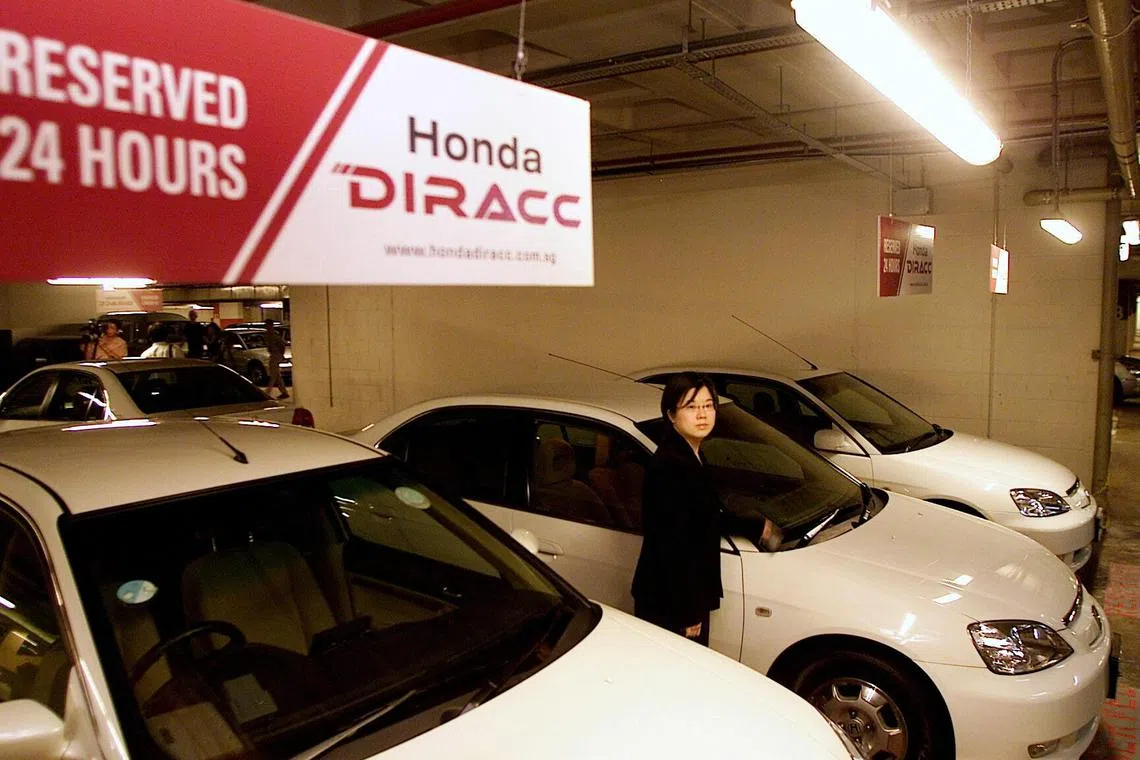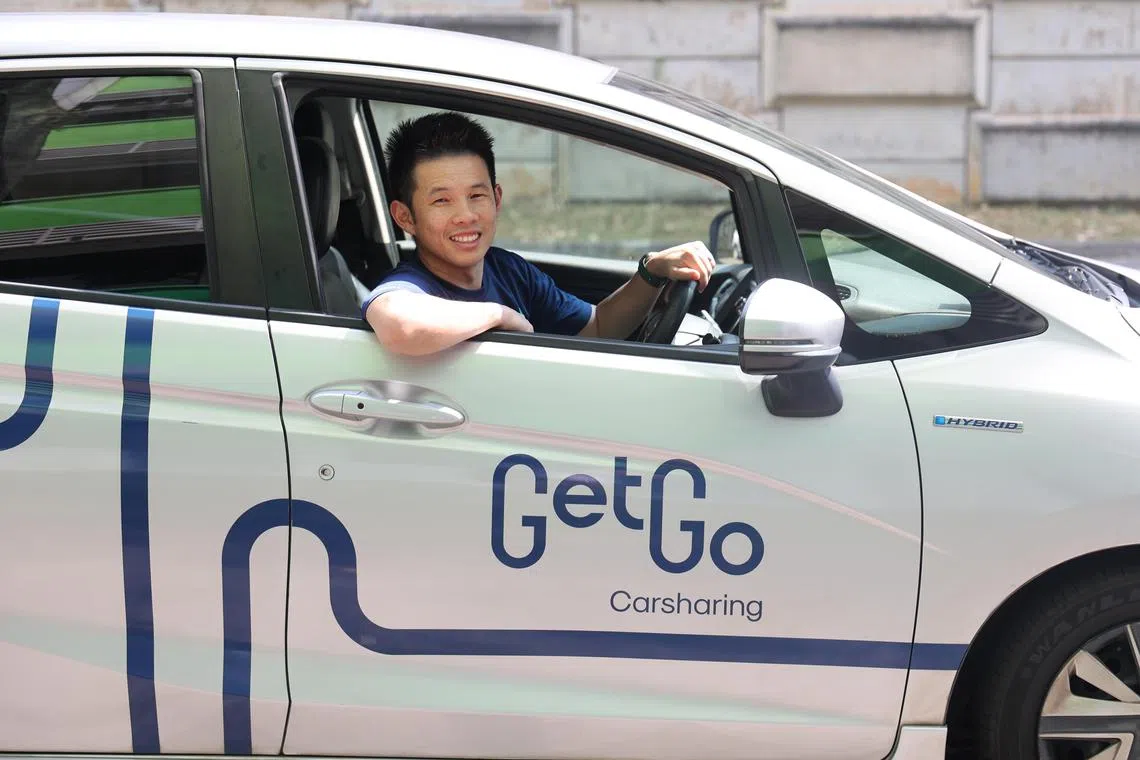Amid BlueSG pause, how are car-sharing firms like Getgo, Tribecar faring?
[SINGAPORE] Electric car-sharing firm BlueSG announced a pause of its current operations last Monday (Aug 4) and laid off most of its staff. Yet, the company is set to launch a new service from 2026 onwards.
Some of Singapore’s characteristics make it suited for car sharing, such as the high cost of car ownership, increasing disposable income and growth of the population.
In recent years, car sharing has been boosted by the convenience of app-based platforms and high Certificate of Entitlement prices.
According to Land Transport Authority statistics, the number of self-drive private hire cars has grown to 31,022 in 2024 from 17,238 in 2014. This includes both conventional long-term rental cars and car sharing vehicles.
Industry estimates that the car-sharing fleet population has grown to around 5,000 vehicles from less than 1,000 in the same period.
The car-sharing landscape in Singapore is estimated to bring in US$182.8 million in revenue by the end of 2025 with an average revenue of S$479 per user, according to research firm Statista. Revenue is projected to increase to US$236.4 million by 2030.
BT in your inbox
Start and end each day with the latest news stories and analyses delivered straight to your inbox.
Keith Kee, CEO of BlueSG, said that car sharing will continue to be a growth industry in the near future, citing Singapore’s high barriers to car ownership.
“I think it’s important that services like BlueSG enable people who have a driving licence, but do not want to have the heavy commitment of owning a car, to be able to still drive. It’s a different experience from other services like public transport or ride hailing. It complements public transport as part of the transport ecosystem in Singapore.”
GetGo CEO Toh Ting Feng concurred, saying he believes that “car sharing continues to grow and deliver more impact and access” in Singapore.
“The cost of living is going up, the cost of labour, land, and cars. At the same time, public transport is getting better, which addresses daily transport needs. So the need for accessible and flexible transport options will grow,” he added.
Shared destiny?
However, car sharing also has challenges here with many past attempts ending in failure.
Car sharing has been around since 1997, when NTUC Income Car Cooperative began operating.
Yet, BlueSG’s troubles are not new. Despite the rosy outlook, there have been many failed attempts at car sharing in Singapore as car-sharing firms grappled with high capital expenditure on fleet size and struggled to maintain service convenience for users.
Honda Diracc, from the Japanese mass-market car brand, closed in 2008, unable to maintain profitability, service standards and vehicle availability amid fluctuating vehicle prices.
CitySpeed Car Sharing by ComfortDelGro wound down in 2007, citing lower Certificate of Entitlement and car prices as usership plunged.
Startup Smove launched in 2011 and became Singapore’s biggest car-sharing fleet by 2018. But it went into liquidation in 2020, due to disruption from the pandemic and was acquired by Drive lah.

Walter Theseira, associate professor of economics at the Singapore University of Social Sciences, said that the fundamental economics of car sharing in Singapore are challenging, with most firms that have been in the space over the last few decades being unsuccessful.
“My long-term outlook (on car sharing) has always been negative, as structurally the aim of public transport policy in Singapore is to reduce car use as much as possible by providing better public transport connectivity,” he said.
He added that in Singapore, capital expenditures on vehicles are high, thus a certain amount of utilisation or revenue is needed to overcome depreciation.
“Currently, it seems easiest to do that through taxis and ride-hailing. Even in the future, that’s likely to be the case through robotaxis. not through self-drive,” he said.
Car sharing in Singapore: the players

Here’s an overview of the firms currently offering car-sharing services in Singapore.
GetGo
GetGo is the largest car-sharing platform in Singapore with over 400,000 subscribers.
Commenced operations: 2021
Fleet size: More than 3,000
Subscription: No subscription
Rates: From S$3 per hour and S$0.39 per kilometre
Locations: More than 1,700
Beyond car sharing, the team behind GetGo launched a long-term car leasing service called ZipZap at the end of July. It will have a minimum rental period of six months, compared to a range of one hour to five days for GetGo.
BlueSG
BlueSG is an electric-only car-sharing platform, but will be pausing operations until 2026 as part of a major upgrade to its tech platform.
Commenced operations: 2017
Fleet size: About 1,000
Subscription: Free, S$8, or S$18 per month
Rates: From S$0.36 to S$0.58 per minute, depending on subscription level and car
Locations: About 1,500 charging points
In a response to The Business Times queries, BlueSG said it had about 250,000 subscribers currently.
Goldbell Group had promised an investment of S$70 million over five years in 2021 when it acquired BlueSG from Bollore Group. The platform was also unique in that rented cars did not need to be returned to their pick-up locations.
Tribecar
Tribecar was the largest car-sharing service in Singapore in March 2022, shortly after its acquisition of the oldest car-sharing company Car Club (formerly NTUC Income Car Cooperative) and further expanded its fleet in 2022 with the acquisition of Popular Rent a Car. While no longer the largest, it is still one of the major players in the Republic.
Commenced operations: 2016
Fleet size: About 1,400
Subscription: Optional, S$139 per month for two hours of driving per weekday
Rates: From S$2.18 per hour, depending on subscription level and car
Locations: More than 750
Tribecar also offers motorcycles, from as low as S$0.55 per hour, or vans from S$4.36 per hour.
Shariot
While GetGo is the largest car-sharing platform, Shariot claims to be the largest van-sharing platform in Singapore. It also offers car rentals, but has carved out its niche within vans.
Commenced operations: 2020
Fleet size: More than 250
Subscription: No subscription
Rates: From S$5.90, S$7.90, or S$9.90 per hour depending on vehicle type
Locations: More than 300
Car Lite
Car Lite is a slightly older platform which, like Tribecar, allows probation plate holders to rent its vehicles.
Commenced operations: 2018
Subscription: No subscription
Rates: From S$1 per 15 minutes
Locations: More than 150
According to Seedly, Car Lite in 2023 had a fleet size of more than 200 cars, though it does not otherwise publicly disclose its figures.
Drive lah
Drive lah is a unique car-sharing service in the list, as it offers a peer to peer sharing. That means that private car owners rent out their own cars to hirers, instead of the cars all being owned by the company.
Commenced operations: 2019
Fleet size: More than 1,300
Subscription: No subscription
Rates: From S$1 per 15 minutes
The company also acquired Smove, another car-sharing platform, in 2020 and integrated its customers and some staff into Drive lah.
In 2023, it secured S$2.7 million in funding from ComfortDelGro for its expansion in Australia, with that operation known as Drive mate.

